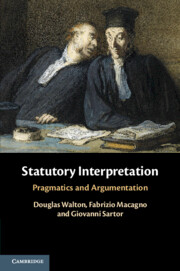Book contents
- Statutory Interpretation
- Statutory Interpretation
- Copyright page
- Dedication
- Contents
- Figures
- Tables
- Acknowledgments
- Introduction
- 1 Interpretation and Statutory Interpretation
- 2 Statutory Interpretation as Problem Solving
- 3 Interpretation and Pragmatics – Legal Ambiguity
- 4 Pragmatic Maxims and Presumptions in Legal Interpretation
- 5 Arguments of Statutory Interpretation and Argumentation Schemes
- 6 Classification and Formalization of Interpretative Schemes
- References
1 - Interpretation and Statutory Interpretation
Published online by Cambridge University Press: 29 December 2020
- Statutory Interpretation
- Statutory Interpretation
- Copyright page
- Dedication
- Contents
- Figures
- Tables
- Acknowledgments
- Introduction
- 1 Interpretation and Statutory Interpretation
- 2 Statutory Interpretation as Problem Solving
- 3 Interpretation and Pragmatics – Legal Ambiguity
- 4 Pragmatic Maxims and Presumptions in Legal Interpretation
- 5 Arguments of Statutory Interpretation and Argumentation Schemes
- 6 Classification and Formalization of Interpretative Schemes
- References
Summary
The English word “interpretation” comes from Latin interpretatio, from interpres, originally meaning an intermediary, broker, or agent, and then also an explainer or translator (De Vaan 2008, 307). In its turn interpres seems to have resulted from the fusion of inter (between) and praes, a word that possibly shares the same root with the Latin pretium (price), thus being linked to the idea of an economic exchange (lending, buying, or selling). The semantic area of “interpretation” is also covered by terms of Greek origin, such as “exegesis” and “hermeneutics,” often used in religious contexts.
- Type
- Chapter
- Information
- Statutory InterpretationPragmatics and Argumentation, pp. 17 - 54Publisher: Cambridge University PressPrint publication year: 2021
References
References
Cases cited
ACLU v. Clapper 2015 785 F.3d 787.
Church of the Holy Trinity v. United States 1892 143 U.S. 457.
District of Columbia v. Heller 2008. 554 U.S. 570.
Dunnachie v. Kingston-upon-Hull City Council 2004 UKHL 36.
Google Spain SL and Google Inc. v. Agencia Española de Protección de Datos (AEPD) and Mario Costeja González 2014 ECLI:EU:C:2014:317.
Rewe-Zentral v. Bundesmonopolverwaltung für Branntwein 1979 ECLI:EU:C:1979:42.
Roe v. Wade 1973. 410 U.S. 113.
Scarlet Extended SA v. Sabam 2012 ECLI:EU:C:2011:771.
X 2013, Case C-486/12, ECLI:EU:C:2013:836.

